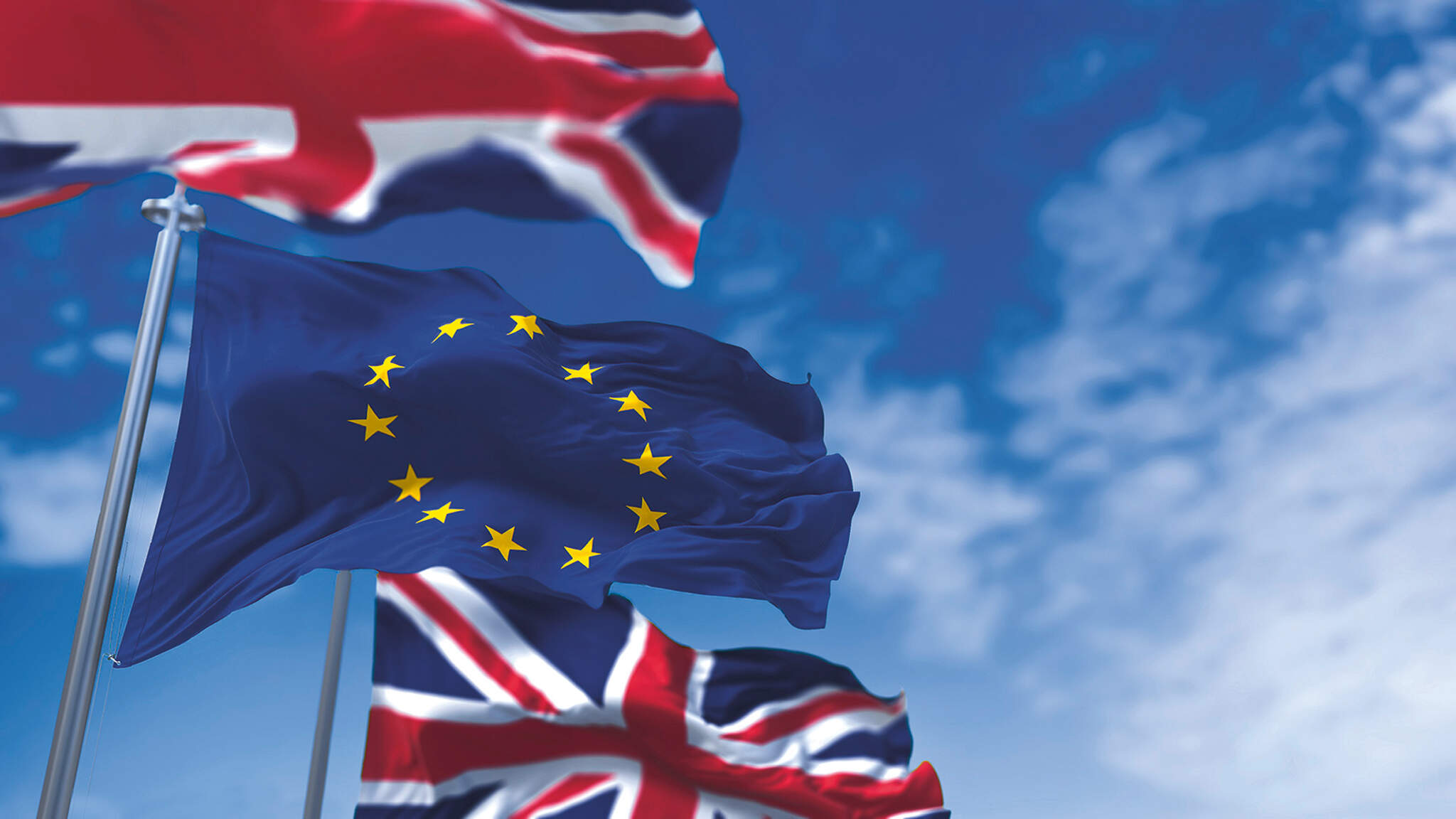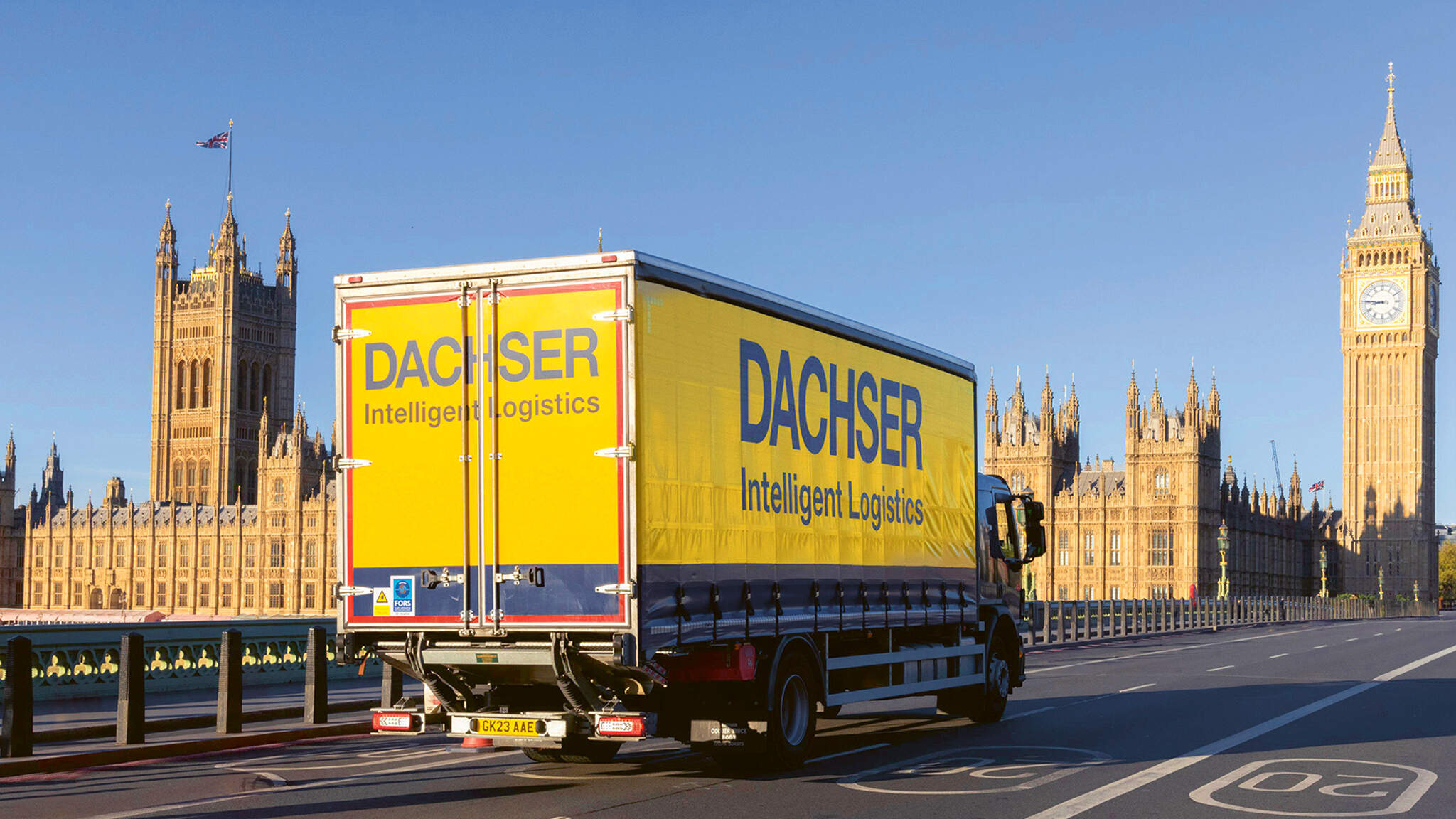Back in play
Four years ago, the UK left the European single market, and its trade relationship with the European Union had to be completely redefined. An unprecedented challenge, for which DACHSER has developed its own solution: Smart Border Connect.

“Game changer” is a big word (okay, two words). Lately, however, the meaning has often been stretched in an attempt to draw attention to even the tiniest product alteration or improvement. But if anyone knows what a real game changer is, then it’s Mark Rollinson, Regional Managing Director of DACHSER UK and Ireland, and Mark Cosgrove, Regional Sales and Commercial Manager UK and Ireland. We met up with them at DACHSER's Northampton logistics center, where the mood was jubilant. “We’ve achieved something big,” Cosgrove says. “A game changer for us and our customers.” Tell us more!
The two are referring to Smart Border Connect, a new logistics service developed by DACHSER. Available as two different service options—Connect40 and Connect42—it clears many of the hurdles now in place at the UK border, which in turn gives British exporters straightforward access to the EU market. “We’ve come up with a tailored customs solution that, for UK exporters trading on DDP incoterms, returns to the historical drivers of logistics purchasing: short transit times and service quality. And all at competitive prices,” Cosgrove says.
For EU member countries, seamless groupage logistics throughout Europe sounds like the most natural thing in the world. In 2023, the DACHSER network alone transported more than 64 million shipments within Europe—without domestic market borders, which meant no customs clearance and none of the considerable administrative and regulatory expense that goes with it.
But this natural order was (in)famously upset on June 23, 2016. That was the day of the referendum in which 52 percent of Brits voted in favor of leaving the EU. This triggered a political earthquake that led to the resignation of then Prime Minister David Cameron and left many politicians at first completely stumped. On March 29, 2017, the UK invoked Article 50 and formally gave notice to the European Council in Brussels of its intention to withdraw from the EU. This started a two-year clock counting down to the end of March 2019, by which time the two sides planned to complete Brexit negotiations. There followed an unprecedented back-and-forth between the UK and the EU as regards the conditions, deadlines, and terms for Brexit. “Everything was suddenly completely up in the air, with no quick fixes anywhere in sight. The only thing we knew for sure was that the bedrock of free trade was about to undergo a fundamental shift. But no one knew exactly what this would mean for UK imports and exports,” Cosgrove recalls. “The clock was ticking and the stress was palpable. Trading partners, freight forwarders, and customs officials needed solutions for which there was no blueprint.”
Many sleepless nights
Several international companies that were able to began relocating their UK operations to the European mainland. “But this simply wasn’t an option for many small and medium-sized enterprises. Instead, they had to find their own solutions for dealing with the new, complex, and at first entirely confusing consequences of Brexit,” Rollinson says. “People at those companies endured many sleepless nights, as did I. We certainly didn’t want to lose our connection to DACHSER’s European network as a result of customs hurdles.”
December 20, 2019, brought some certainty: the UK House of Commons approved the Withdrawal Agreement Bill by a vote of 353 to 243. A little over four weeks later, on January 31, 2020, the UK left the EU at 11 p.m. local time (midnight CET) yet remained in the single market until the end of that year. “That at least gave the logistics industry a little more time to get a handle on the new situation and establish suitable conditions for the new system for transporting goods between the UK and the EU. Then the coronavirus pandemic happened, and the nightmare was complete,” Rollinson says. “I could never have imagined such a scenario. It was like something out of a disaster movie, except it was really happening. We just had to make the best of it.”
Looking back now, Rollinson and Cosgrove can still recall how crazy things were at the time. “All rules, processes, and procedures were being reexamined. That knocked out many of the UK’s companies and medium-sized freight forwarders. But we had considerable expert, financial, and above all emotional support from DACHSER, its shareholders, and the Head Office,” Rollinson says.
Smart Border Connect is a tailored solution that DACHSER developed to help UK exporters minimize the effects of Brexit for their EU customers,” says Alexander Tonn, COO Road Logistics. “Thanks to preclearance, they can now offer their European target markets transit times similar to the pre-Brexit era.
To prepare for life in the post-Brexit era, DACHSER UK first had to build up expertise in the new conditions for imports and exports. “We needed customs experts, but there were essentially none out there to be had. So in 2021, we started working with the DACHSER Head Office to train some ourselves,” Rollinson says. In addition to getting to grips with the new customs requirements, the team had to train additional individuals in matters of compliance, operations, cash flow, and much more besides. The plan worked, and within a very short time, the team of customs experts grew from 16 to 150. “But then the challenge became providing all these people with somewhere to work, meaning office space and the necessary technical equipment. Another massive effort, but one that paid off,” Rollinson says.
And that brings us back to Smart Border Connect. In response to Brexit, DACHSER had already introduced a special portal for customs documents and assisted its own customs hub in expanding shared service center structures for various countries. Building on this work, and incorporating many ideas generated by the DACHSER UK think tank, the Smart Border Connect solution was developed over a period of 12 months and launched in February 2024. It provides a framework for DACHSER to transport goods on behalf of UK customers mostly via the French smart border— and on to the rest of Europe—quickly, reliably, and smoothly while also handling all matters relating to customs, taxes, and duties. What’s more, transit times for regular groupage services are roughly what they were before Brexit. Exporters in the UK using this service can breathe a sigh of relief.

Preclearance to minimize transit time
All this is based on the use of the delivered duty paid (DDP) Incoterms. Since DDP makes the sender responsible for customs clearance duties and VAT, the customer no longer has to pay to receive the shipment. The goods can then be delivered in free circulation just like a domestic shipment and seamlessly integrated into DACHSER’s European network with its connections to all EU countries—with no increase in transit time or administrative effort.
“Since we introduced Smart Border Connect, we’ve experienced a surge in demand from existing and new customers alike. Many customers decided to adopt DDP Incoterms for their shipments in order to benefit from DACHSER’s transit times, which are the shortest on the market,” Cosgrove says. “We really struck a chord here.”
“Smart Border Connect is of interest not only to the UK,” Rollinson adds, “but to third countries as well—for instance, to integrate additional non-EU countries like Switzerland and Norway. It’s going to get really exciting when DACHSER integrates its European Logistics and Air & Sea Logistics business fields even more closely with a view to offering a global door-to-door groupage solution. With Smart Border Connect in the toolbox, this knowledge has the potential to bring old and new growth markets around the world closer together and make them more efficient.” Cosgrove adds, “It’s definitely going to be another game changer.” Is that an exaggeration? Perhaps—but if anyone knows, it's the people of the UK.